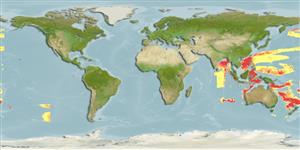Elasmobranchii (sharks and rays) >
Squaliformes (Sleeper and dogfish sharks) >
Etmopteridae (Lantern sharks)
Etymology: Etmopterus: Greek, ethmos, -ou = sieve or ethmoides bone + Greek, pteron = wing, fin (Ref. 45335); evansi: Named for D. Evans..
More on authors: Last, Burgess & Séret.
Environment: milieu / climate zone / depth range / distribution range
Ecology
Marine; pelagic-oceanic; depth range 430 - 689 m (Ref. 124468). Deep-water
Indo-West Pacific: off northern Western Australia, Indonesia, and Papua New Guinea.
Size / Weight / Age
Maturity: Lm ? range ? - ? cm
Max length : 32.0 cm TL male/unsexed; (Ref. 106604); 29.7 cm TL (female)
Short description
Morphology | Morphometrics
Vertebrae: 76 - 82. Body slender. Dorsal and ventral coloration strongly contrasted; dots and dashes absent on upper half; dark ventral saddle on posterior third of caudal peduncle; prominent dark bands at the tip and through mid caudal fin. Eyes rather narrow; upper eyelid with pale naked patch. Caudal peduncle elongate (18.9-21.8% TL). Denticles extremely dense, very thin, delicate, arranged in poorly defined longitudinal rows. Flank marking base under or slightly forward of second dorsal spine; its posterior branch barely reaching free rear tip of second dorsal fin; central caudal marking absent; finger of caudal base marking very long, more than 7% TL. Monospondylous centra 37-38 (Ref. 45056).
Ovoviviparous (Ref. 205).
Life cycle and mating behavior
Maturity | Reproduction | Spawning | Eggs | Fecundity | Larvae
Distinct pairing with embrace (Ref. 205).
Last, P., G.H. Burgess and B. Séret, 2002. Description of six new species of lantern-sharks of the genus Etmopterus (Squaloidea: Etmopteridae) from the Australasian region. Cybium 26(3):203-223. (Ref. 45056)
IUCN Red List Status (Ref. 130435)
Threat to humans
Harmless
Human uses
More information
Age/SizeGrowthLength-weightLength-lengthLength-frequenciesMorphometricsMorphologyLarvaeLarval dynamicsRecruitmentAbundanceBRUVS
ReferencesAquacultureAquaculture profileStrainsGeneticsElectrophoresesHeritabilityDiseasesProcessingNutrientsMass conversion
Tools
Special reports
Download XML
Internet sources
Estimates based on models
Preferred temperature (Ref.
123201): 6.8 - 10.5, mean 8.2 °C (based on 38 cells).
Phylogenetic diversity index (Ref.
82804): PD
50 = 0.5000 [Uniqueness, from 0.5 = low to 2.0 = high].
Bayesian length-weight: a=0.00380 (0.00191 - 0.00758), b=3.09 (2.92 - 3.26), in cm total length, based on LWR estimates for this Genus-body shape (Ref.
93245).
Trophic level (Ref.
69278): 4.0 ±0.5 se; based on size and trophs of closest relatives
Resilience (Ref.
120179): Low, minimum population doubling time 4.5 - 14 years (Fec assumed to be <100).
Fishing Vulnerability (Ref.
59153): Low vulnerability (22 of 100).
